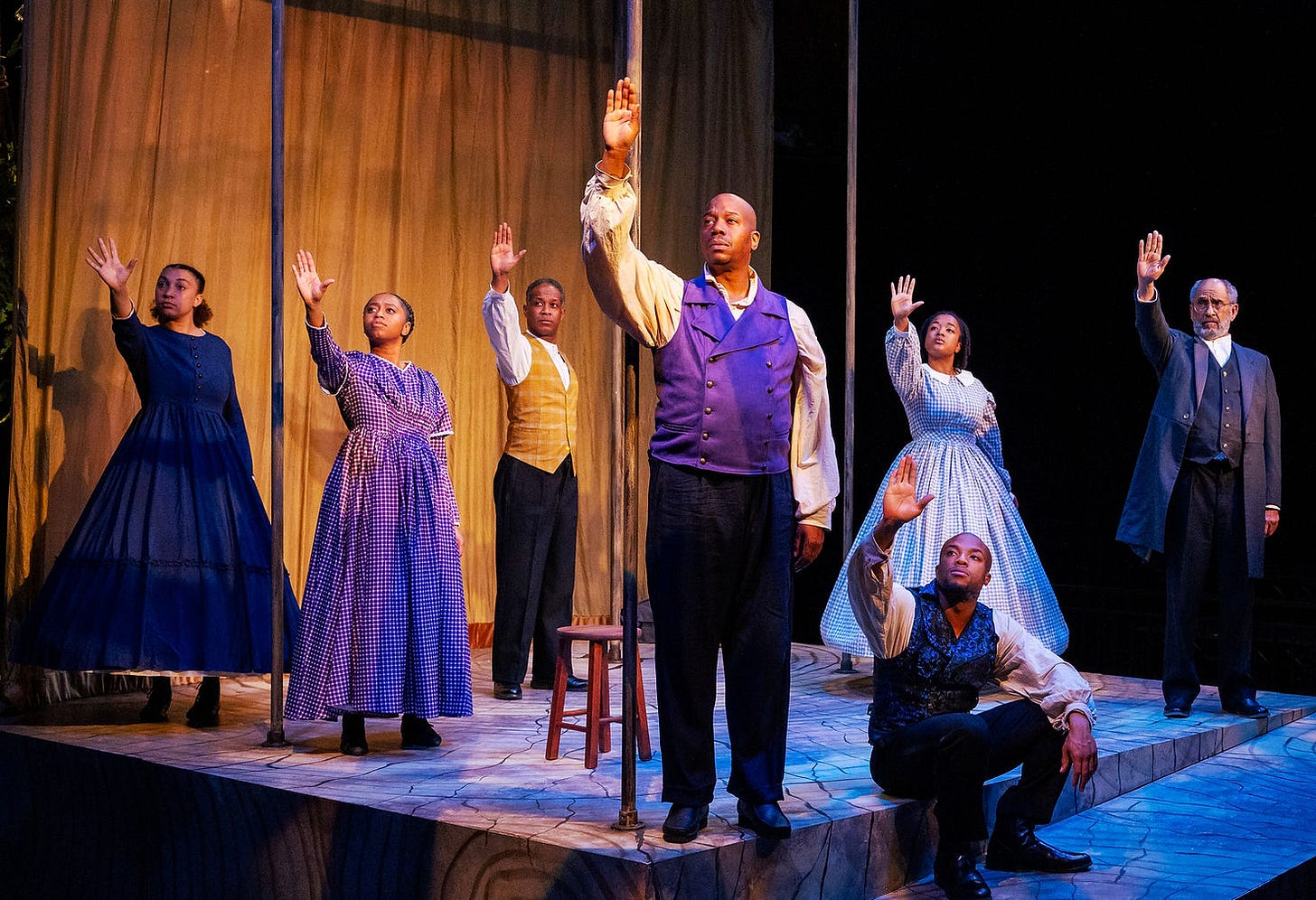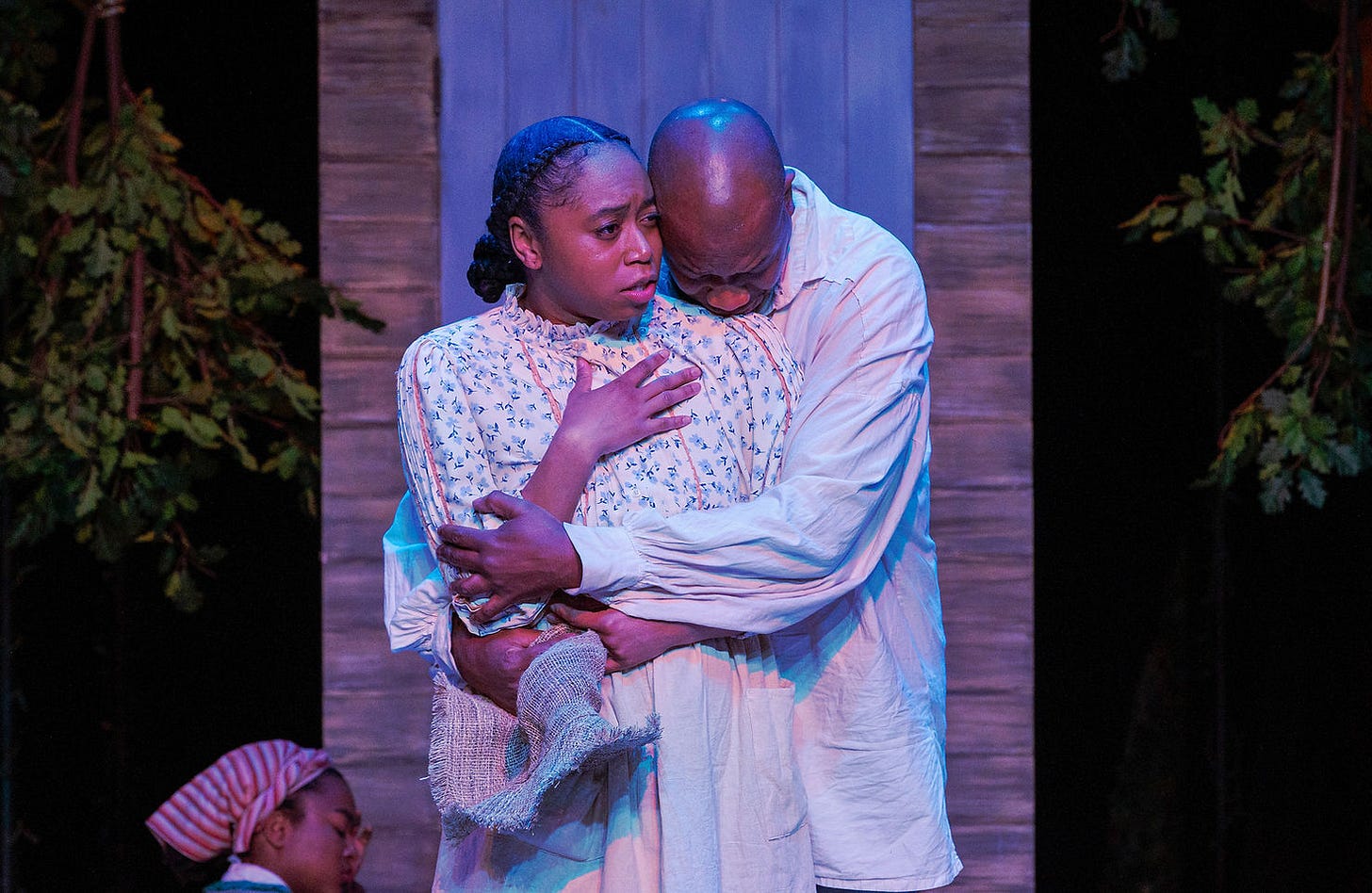REVIEW:Father Comes Home From the Wars Parts I, II & III (Quintessence Theatre Group, Germantown PA)
Quintessence Theatre Group presents Suzan-Lori Parks epic play in a solidly performed and directed production.
What makes Greek myths and tragedies so interesting and everlasting in the theatrical landscape is how they can so effectively be adapted to tell parallel stories in different time periods and locations. Suzan-Lori Parks chose to do just that in her sprawling epic Father Comes Home from the Wars Parts I, II & III, adapting various elements of Homer’s Odyssey to tell the tale of a slave who travels with his master during the American Civil War. Park’s mastery of language is on full display at Quintessence Theatre, in a production that is often impactful, but lacking in a few areas.
Epic Storytelling
While Homer’s Odyssey tells the tale of Odysseus returning from the Trojan War, Parks’ version tells the tale of Hero, a slave in Texas, who is tasked with joining his master to fight for the Confederacy during the American Civil War. The story is broken into three parts (Part I: Measure of a Man; Part II: Battle in the Wilderness; Part III: The Union of my Confederate Parts) that all collectively tell Hero’s story. Parks’ adaptation is loose, and rather than be a beat for beat retread of Homer’s tale, uses the existing themes to help explore the complexities of slavery. That is not to say that Parks ever attempts to speak kindly of slavery (she doesn’t), but she instead explores the ethos and pathos of her main character, to ponder on the perks of freedom when the world still treats you as less than human.
It’s an interesting, and at times difficult, conversation that Parks never fully answers. She uses her characters to examine these ideas from different angles, especially in Part II where Hero comes face to face with a light-skinned Union Soldier. Their back and forth exchange of thoughts about whether freedom robs one of a purpose was highly compelling. She also explores similar complex ideas through the character of Penny, Hero’s wife who stays behind: desperately waiting for him to return. Penny struggles with the initial idea of Hero leaving in Part I, and that storyline continues when she returns to the story in Part III. The means with which Penny has had to survive are complicated, with certain relationships having an unbalanced power dynamic. In this, however, Parks is able to explore the strength and survival of Black women by giving Penny all of the power in the final moments of the play. It is a fascinating ending that is as compelling as it is uncomfortable.

Solid Production
To stage this play is no easy feat, and for the most part Quintessence’s production meets the lofty heights of the script. That is in part because of some stellar performances and wonderful direction. Director Raelle Myrick-Hodges uses the space well, and helps imbue the actors with the sense of gravitas this play demands. She keeps the pace flowing, though it does take a little time for the actors to get into a solid rhythm. Performances are strong across the board, with standouts being Deja Anderson-Ross as Penny, Donovan Whitney as Smith, and Kelechi Udenkwo as Hero. Anderson-Ross in particular is sensational as Penny, with her scenes in Part III being some of the best moments of the piece.
Where this show unfortunately fumbled was in the technical aspects. The set was a touch plain, and didn’t have the usual drama that Quintessence produces. It was slightly elevated, but that was never really utilized in a way that felt intentional. Lighting and Sound oftentimes felt underwhelming, and there were several times where cues/shifts felt out of time with the script. The costumes were okay, but at times disappeared into the set as they were often similar colors. As a whole, it felt like a lot of time was spent on the text of the piece, with not enough focus on the look.

Father Comes Home from the Wars Parts I, II, & III is a series of plays that will make you think. The dialogue seamlessly transitions from poetic musings on the price of individuality, to somber, heated discussions on race and what it means to be free. Parks’ text is tackled with a lot of intention and care in Quintessence’s production, with some truly remarkable performances and moments. While it is disheartening to see some production elements struggle to keep pace with the text, that doesn’t stop this play from being an important, if challenging, addition to the modern classics.
Father Comes Home from the Wars Parts I, II, & III is playing at Quintessence Theatre Group (7137 Germantown Ave.) from now until June 23rd, 2024.
For more information visit quintessencetheatre.org.


